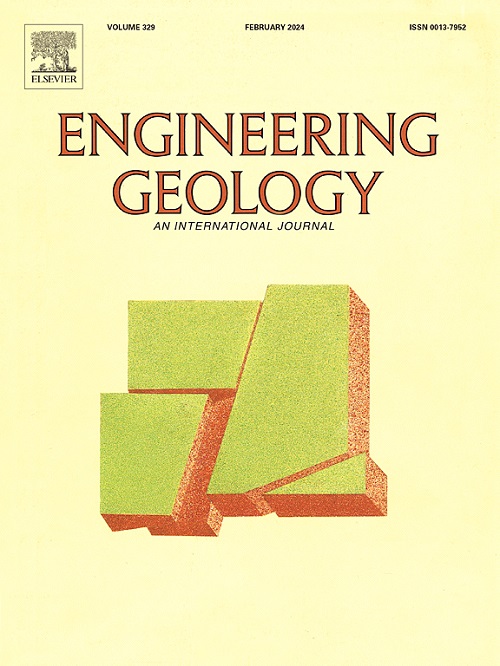耦合应力和透射率,确定裂隙岩的等效定向导水性
IF 6.9
1区 工程技术
Q1 ENGINEERING, GEOLOGICAL
引用次数: 0
摘要
我们开发了一种 DFN(离散断裂网络)建模方法,用于将应力与断裂透射率耦合,并评估大尺度岩体的导水性。透射率-应力耦合依赖于作用在断裂上的法向应力与断裂透射率之间的负指数相关性,以残余孔隙和最大孔隙为界。通过半分析方法,将远距离应力和断裂本身引起的局部应力波动结合起来,计算出作用在 DFN 每条断裂上的法向应力。根据球形渗透仪的设置,对所有方向的等效导流系数进行数值计算。计算结果首先是一个点云,其中每个点定义了一个方向和一个等效水力传导率。通过分析等效水力传导率的分布,确定平均值、优先方向和各向异性比。整个工作流程是在数值平台 DFN.lab 中开发的。针对与瑞典 Forsmark 现场条件类似的压裂和原位应力条件,说明了该方法研究原位应力对岩体导水性影响的能力。我们发现,裂缝引起的应力波动对所产生的导水性场有重大影响。它们将各向异性比限制在接近 3 倍的数值,而渗透率分布则与方向相关,并跨越几个数量级。通过改变透射率-应力定律的参数进行的敏感性分析,定量地显示了定向导水性是如何受到原位应力方向或 DFN 潜在连通结构的控制的。本文章由计算机程序翻译,如有差异,请以英文原文为准。
Coupling stress and transmissivity to define equivalent directional hydraulic conductivity of fractured rocks
A DFN (Discrete Fracture Network) modelling approach is developed to couple stresses with fracture transmissivities and to evaluate large scale rock mass hydraulic conductivity. The transmissivity-stress coupling relies on a negative exponential correlation between normal stress acting on a fracture and fracture transmissivity, bounded by residual and maximal apertures. The remote stresses and the local stress fluctuations induced by the fractures themselves are combined in a semi-analytical approach to compute the normal stress acting on each fracture of a DFN. Directional equivalent hydraulic conductivities are numerically computed in all directions from a spherical permeameter setup. The resulting properties are first a cloud of points, where each point defines a direction and an equivalent hydraulic conductivity. The distribution of equivalent hydraulic conductivities is analyzed to define mean values, preferential directions and anisotropy ratio. The entire workflow is developed in the numerical platform DFN.lab. The capacity of the method to investigate the impact of the in-situ stresses on the rock mass hydraulic conductivity is illustrated for fracturing and in-situ stress conditions similar to the conditions at the Forsmark site in Sweden. We find that the stress fluctuations induced by the fractures have a significant impact on the resulting hydraulic conductivity field. They limit the anisotropy ratio to values close to a factor of 3 while the transmissivity distribution is correlated to orientations and spans several orders of magnitude. Sensitivity analyses, performed by changing the parameters of the transmissivity-stress law, show quantitatively how the directional hydraulic conductivities are rather controlled by the orientations of the in-situ stresses or by the underlying connectivity structure of the DFN.
求助全文
通过发布文献求助,成功后即可免费获取论文全文。
去求助
来源期刊

Engineering Geology
地学-地球科学综合
CiteScore
13.70
自引率
12.20%
发文量
327
审稿时长
5.6 months
期刊介绍:
Engineering Geology, an international interdisciplinary journal, serves as a bridge between earth sciences and engineering, focusing on geological and geotechnical engineering. It welcomes studies with relevance to engineering, environmental concerns, and safety, catering to engineering geologists with backgrounds in geology or civil/mining engineering. Topics include applied geomorphology, structural geology, geophysics, geochemistry, environmental geology, hydrogeology, land use planning, natural hazards, remote sensing, soil and rock mechanics, and applied geotechnical engineering. The journal provides a platform for research at the intersection of geology and engineering disciplines.
 求助内容:
求助内容: 应助结果提醒方式:
应助结果提醒方式:


